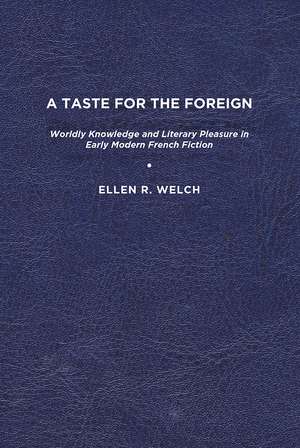A Taste for the Foreign: Worldly Knowledge and Literary Pleasure in Early Modern French Fiction
Autor Ellen R. Welchen Limba Engleză Paperback – 14 mar 2011 – vârsta ani
A Taste for the Foreign examines foreignness as a crucial aesthetic category for the development of prose fiction from Jacques Amyot’s 1547 translation of The Ethiopian Story to Antoine Galland’s early eighteenth-century version of The Thousand and One Nights. While fantastic storylines and elements of magic were increasingly shunned by a neo-classicist literary culture that valued verisimilitude above all else, writers and critics surmised that the depiction of exotic lands could offer a superior source for the novelty, variety, and marvelousness that constituted fiction’s appeal. In this sense, early modern fiction presents itself as privileged site for thinking through the literary and cultural stakes of exoticism, or the taste for the foreign. Long before the term exoticism came into common parlance in France, fiction writers thus demonstrated their understanding of the special kinds of aesthetic pleasure produced by evocations of foreignness, developing techniques to simulate those delights through imitations of the exotic. As early modern readers eagerly consumed travel narratives, maps, and international newsletters, novelists discovered ways to blur the distinction between true and imaginary representations of the foreign, tantalizing readers with an illusion of learning about the faraway lands that captured their imaginations.
This book analyzes the creative appropriations of those scientific or documentary forms of writing that claimed to inform the French public about exotic places. Concentrating on the most successful examples of some of the most important sub-genres of prose fiction in the long seventeenth century—heroic romances, shorter urban novels, fictional memoirs, and extraordinary voyages—the book examines how these types of fiction creatively appropriate the scientific or documentary forms of writing that claimed to inform the French public about exotic places.
Published by University of Delaware Press. Distributed worldwide by Rutgers University Press.
This book analyzes the creative appropriations of those scientific or documentary forms of writing that claimed to inform the French public about exotic places. Concentrating on the most successful examples of some of the most important sub-genres of prose fiction in the long seventeenth century—heroic romances, shorter urban novels, fictional memoirs, and extraordinary voyages—the book examines how these types of fiction creatively appropriate the scientific or documentary forms of writing that claimed to inform the French public about exotic places.
Published by University of Delaware Press. Distributed worldwide by Rutgers University Press.
Preț: 385.72 lei
Nou
Puncte Express: 579
Preț estimativ în valută:
73.81€ • 80.42$ • 62.19£
73.81€ • 80.42$ • 62.19£
Carte tipărită la comandă
Livrare economică 23 aprilie-07 mai
Preluare comenzi: 021 569.72.76
Specificații
ISBN-13: 9781644531396
ISBN-10: 1644531399
Pagini: 248
Dimensiuni: 152 x 229 x 18 mm
Greutate: 0.38 kg
Editura: University of Delaware Press
Colecția University of Delaware Press
ISBN-10: 1644531399
Pagini: 248
Dimensiuni: 152 x 229 x 18 mm
Greutate: 0.38 kg
Editura: University of Delaware Press
Colecția University of Delaware Press
Notă biografică
Ellen R. Welch is Professor of French at the University of North Carolina, Chapel Hill
Cuprins
Manufacturing foreignness: exoticism, commodities, and the novel
Fiction and the aesthetics of foreignness
Armchair conquests: heroic romance and the cartographies of desire
Cosmopolitan seductions: city guides and Parisian novels
Secret agents, foreign courts: international voyeurism in memoir fictions
Consuming curiosities in extraordinary voyage novels
L'utile et l'agréable in the age of orientalism
Fiction and the aesthetics of foreignness
Armchair conquests: heroic romance and the cartographies of desire
Cosmopolitan seductions: city guides and Parisian novels
Secret agents, foreign courts: international voyeurism in memoir fictions
Consuming curiosities in extraordinary voyage novels
L'utile et l'agréable in the age of orientalism
Recenzii
"This is an impressive book on many different levels. […] Having focused on the importance of pleasure in the reading experience, Welsh successfully applies the same principle to her own act of writing. My delight and pleasure in reading this book is a true tribute not only to Welsh’s stylistic abilities, but also to the sharpness of her nuanced, well-articulated insights. […] Welsh has written a highly rewarding book that constitutes a major contribution to seventeenth-century French studies."
"Welch offers unique, thought-provoking, and original close readings of seventeenth-century French fiction."
Descriere
A Taste for the Foreign examines foreignness as a crucial aesthetic category for the development of prose fiction from Jacques Amyot’s 1547 translation of The Ethiopian Story to Antoine Galland’s early eighteenth-century version of The Thousand and One Nights. While fantastic storylines and elements of magic were increasingly shunned by a neo-classicist literary culture that valued verisimilitude above all else, writers and critics surmised that the depiction of exotic lands could offer a superior source for the novelty, variety, and marvelousness that constituted fiction’s appeal.
